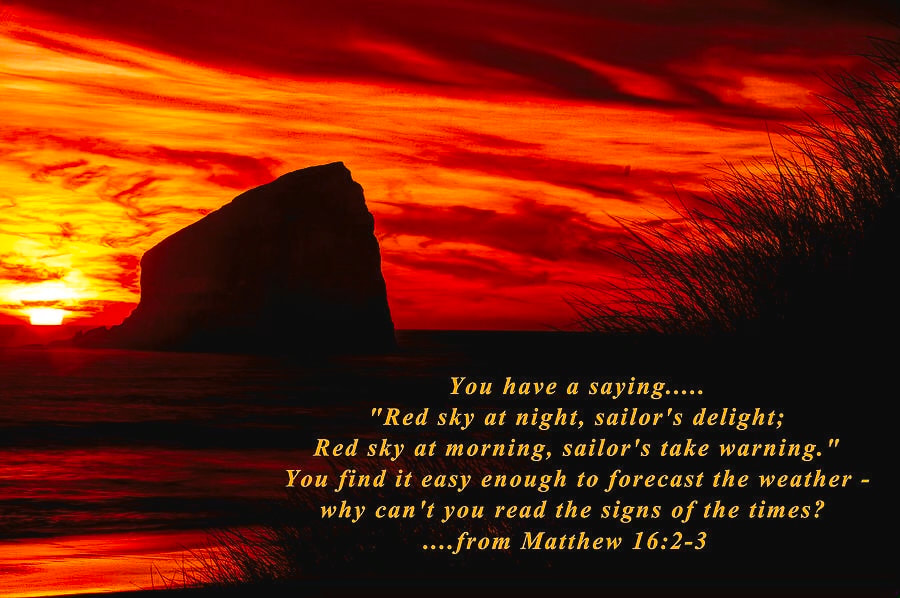'On the evening of May 7, residents of China's port city Zhoushan pressed the panic button as the city skies suddenly turned blood red, confusing locals and causing people on social media to declare an apocalypse. The videos – taken on May 7 and spread on Chinese social media platforms show confused onlookers gazing at the unusual sky. According to the Zhoushan Meteorological Bureau, the glow was caused by the lights from fishing boats in the local port.'
"When weather conditions are good, more water in the atmosphere forms aerosols which refract and scatter the light of fishing boats and create the red sky seen by the public," the bureau told Global Times.'
The phrase “sign of Jonah” was used by Jesus as a typological metaphor for His future crucifixion, burial, and resurrection. Jesus answered with this expression when asked by the Pharisees for miraculous proof that He was indeed the Messiah. The Pharisees remained unconvinced of Jesus’ claims about Himself, despite His having just cured a demon-possessed man who was both blind and mute. Shortly after the Pharisees accused Jesus of driving out demons by the power of Satan, they said to Him, “Teacher, we want to see a sign from you.” He answered, “A wicked and adulterous generation asks for a sign! But none will be given it except the sign of the prophet Jonah. For as Jonah was three days and three nights in the belly of a huge fish, so the Son of Man will be three days and three nights in the heart of the earth. The men of Nineveh will stand up at the judgment with this generation and condemn it; for they repented at the preaching of Jonah, and now something greater than Jonah is here” (Matthew 12:38–41).
To fully appreciate the answer that Jesus gave, we must go to the Old Testament book of Jonah. In its first chapter, we read that God commanded the prophet Jonah to go to the city of Nineveh and warn its people that He was going to destroy it for its wickedness. Jonah disobediently ran from the Lord and headed for the city of Tarshish by boat. The Lord then sent a severe storm that caused the crew of the ship to fear for their lives. Jonah was soon thrown overboard and swallowed by a great fish where he remained for “three days and three nights” (Jonah 1:15–17). After the three-day period, the Lord caused the great fish to vomit Jonah out onto dry land (Jonah 2:10).
It is this three days that Jesus was referring to when He spoke of the sign of Jonah. Jesus had already been producing miracles that were witnessed by many. Jesus had just performed a great sign in the Pharisees’ presence by healing a deaf man who was possessed of a demon. Rather than believe, they accused Jesus of doing this by the power of Satan. Jesus recognized their hardness of heart and refused to give them further proof of His identity. However, He did say that there would be one further sign forthcoming, His resurrection from the dead. This would be their final opportunity to be convinced.
Jesus’ paralleling of the Pharisees with the people of Nineveh is telling. The people of Nineveh repented of their evil ways (Jonah 3:4–10) after hearing Jonah’s call for repentance, while the Pharisees continued in their unbelief despite being eyewitnesses to the miracles of Jesus. Jesus was telling the Pharisees that they were culpable for their unbelief, given the conversion of the people of Nineveh, sinners who had received far less evidence than the Pharisees themselves had witnessed.
But what are we to make of the phrase “three days and three nights”? Was Jesus saying that He would be dead for three full 24-hour periods before He would rise from the dead? It does not appear so. The phrase “three days and three nights” need not refer to a literal 72-hour period. Rather, according to the Hebrew reckoning of time, the days could refer to three days in part or in whole. Jesus was probably crucified on a Friday (Mark 15:42). According to the standard reckoning, Jesus died at about 3:00 PM (Matthew 27:46) on Friday (day 1). He remained dead for all of Saturday (day 2) and rose from the dead early on Sunday morning (day 3). Attempts to place Jesus’ death on Wednesday to accommodate a literal 72-hour period are probably unnecessary once we take into account the Hebrew method of reckoning of each day as beginning at sundown. So it seems that the expression “three days and three nights” was used as a figure of speech meant to signify any part of three days.
God would often use signs (or miracles) in the Bible to authenticate His chosen messenger. The Lord provided Moses with several miraculous signs in order to prove to others that he was appointed by God (Exodus 4:5–9; 7:8–10;19-20). God sent down fire on Elijah’s altar during Elijah’s contest with the prophets of Baal (1 Kings 18:36–39). He performed this miracle to prove that the God of Israel was the one true God. Jesus Himself would perform many miracles (or “signs”) to demonstrate His power over nature (Matthew 4:23; Mark 6:30–44; Luke 8:22–24; John 6:16–24). The “sign of Jonah” would turn out to be Jesus’ greatest miracle of all. Jesus’ resurrection from the dead would be God’s chief sign that Jesus was Israel’s long-awaited Messiah (Acts 2:23–32) and establish Christ’s claims to deity (Romans 1:3–4).
Matthew 16
The Demand for a Sign(A)16 The Pharisees and Sadducees(B) came to Jesus and tested him by asking him to show them a sign from heaven.(C)
2 He replied, “When evening comes, you say, ‘It will be fair weather, for the sky is red,’ 3 and in the morning, ‘Today it will be stormy, for the sky is red and overcast.’ You know how to interpret the appearance of the sky, but you cannot interpret the signs of the times.[a](D) 4 A wicked and adulterous generation looks for a sign, but none will be given it except the sign of Jonah.”(E) Jesus then left them and went away.
The Yeast of the Pharisees and Sadducees5 When they went across the lake, the disciples forgot to take bread. 6 “Be careful,” Jesus said to them. “Be on your guard against the yeast of the Pharisees and Sadducees.”(F)
7 They discussed this among themselves and said, “It is because we didn’t bring any bread.”
8 Aware of their discussion, Jesus asked, “You of little faith,(G) why are you talking among yourselves about having no bread? 9 Do you still not understand? Don’t you remember the five loaves for the five thousand, and how many basketfuls you gathered?(H) 10 Or the seven loaves for the four thousand, and how many basketfuls you gathered?(I) 11 How is it you don’t understand that I was not talking to you about bread? But be on your guard against the yeast of the Pharisees and Sadducees.”12 Then they understood that he was not telling them to guard against the yeast used in bread, but against the teaching of the Pharisees and Sadducees.(J)
Peter Declares That Jesus Is the Messiah(K)13 When Jesus came to the region of Caesarea Philippi, he asked his disciples, “Who do people say the Son of Man is?”
14 They replied, “Some say John the Baptist;(L)others say Elijah; and still others, Jeremiah or one of the prophets.”(M)
15 “But what about you?” he asked. “Who do you say I am?”
16 Simon Peter answered, “You are the Messiah, the Son of the living God.”(N)
17 Jesus replied, “Blessed are you, Simon son of Jonah, for this was not revealed to you by flesh and blood,(O) but by my Father in heaven.(P) 18 And I tell you that you are Peter,[b](Q) and on this rock I will build my church,(R) and the gates of Hades[c] will not overcome it. 19 I will give you the keys(S) of the kingdom of heaven; whatever you bind on earth will be[d] bound in heaven, and whatever you loose on earth will be[e] loosed in heaven.”(T) 20 Then he ordered his disciples not to tell anyone(U) that he was the Messiah.
Jesus Predicts His Death(V)21 From that time on Jesus began to explain to his disciples that he must go to Jerusalem(W) and suffer many things(X) at the hands of the elders, the chief priests and the teachers of the law,(Y) and that he must be killed(Z) and on the third day(AA) be raised to life.(AB)
22 Peter took him aside and began to rebuke him. “Never, Lord!” he said. “This shall never happen to you!”
23 Jesus turned and said to Peter, “Get behind me, Satan!(AC) You are a stumbling block to me; you do not have in mind the concerns of God, but merely human concerns.”
24 Then Jesus said to his disciples, “Whoever wants to be my disciple must deny themselves and take up their cross and follow me.(AD) 25 For whoever wants to save their life[f] will lose it, but whoever loses their life for me will find it.(AE)26 What good will it be for someone to gain the whole world, yet forfeit their soul? Or what can anyone give in exchange for their soul? 27 For the Son of Man(AF) is going to come(AG) in his Father’s glory with his angels, and then he will reward each person according to what they have done.(AH)
28 “Truly I tell you, some who are standing here will not taste death before they see the Son of Man coming in his kingdom.”


 RSS Feed
RSS Feed
























































